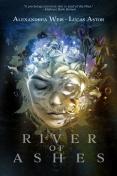
LitPick Review
Of course Beau Devereaux has a dark side. He's the popular football quarterback, good looking, rich, an academic success, and everyone likes him. He also throws the best parties down by the river. His father owns the town, running a lucrative business that employs most of the town residents. He also stands in a long line of Devereauxs. But it's not the family pressure that drives Beau's dark side. He believes he owns the river and the parties he hosts there are just an extension of himself, doing his sinister will. His dark side, hidden behind the good-guy exterior, might be cliche. The depth of that darkness, and what drives it, are not. If the people around him are powerless to stop him, perhaps the evil lurking near the river at The Abbey will prove powerful enough.
Opinion:
There are definitely some cliche moments in this book. Beau Devereaux is the proto-typical high school superhero who everyone likes and no one suspects. The female characters have some cliche elements to them as well: good-looking, rich, cheerleader types. Some of the characters have real depth, which is really what drives this story. Leslie is a complex character. Derek and Beau are both complex characters as well. So even though Beau is predictably the bad guy, you can't tell how bad until it gets there. This book is an excellent commentary aligning with the #MeToo movement. How many high school girls suffer this greatly because of a sadistic pretty boy? How many young men are dragged along by a "friend" like Beau, only to be betrayed, deceived, and used? The grave sadness of these kinds of things is made worse by the fact that so many young women don't report young men like Beau for a whole host of reasons. Dirt bags like Beau keep getting away with it. Why is he like that? Beau himself doesn't give us a lot of clues. Clearly he has issues with his father. But it isn't just the pressure of having to live up to his dad's prestine image in the community. His father is a serial adulterer. His mother is selfish, ashamed, and afraid. But there's no commentary on the father's sins. There aren't any comments about the rampant sexuality and fornication of the high school boys and girls either. There's a lesson in that as well: if you're living for sex and seeking it out, you might get it, but sex only satisfies for so long, and other desires might clamor for attention. I also thought there should be some reflection on the revenge in the story. Revenge seems sweet, especially when enacted against a terrible wretch of a person. It satisfies, but it's not just. In fact, the revenge isn't any better than the crimes already committed. It's more powerful in the story because it wins. But if Leslie is a better person, she's not better for getting her revenge. It can consume her, just as much as Beau's lust consumed him. There's a lesson there, too: while the #MeToo movement was right to point out grave injustices, it often committed grave injustices by seeking revenge instead of true justice.


